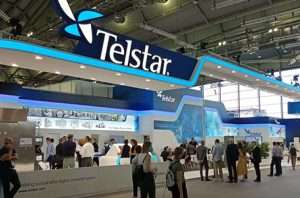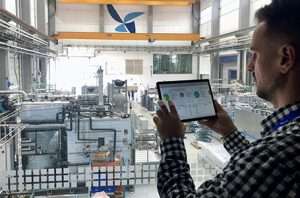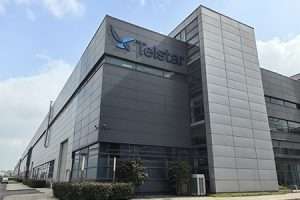The results of the last carbon footprint study reveal that Telstar emitted a total of 10,740 tonnes of CO2 in 2023. The company has undergone a 10.2% reduction of C02 direct emissions compared to the previous year. Our forecast is to continue with this trend reaching 8.5% reduction of direct emissions in 2024. With the completion of a carbon footprint study, we outline strategic action lines towards being a carbon neutral organization in 2050.
We are gradually advancing in the implementation of measures that contribute to this objective: electricity consumption comes from 100% renewable energy since 2021; solar and aerothermal water-heating systems for general services have been installed; offices have been turned into a paperless shopfloor, reducing the use of materials in internal administration, and design and material manufacturing processes; waste segregation, use of recyclable paper and replacing plastic bags have been implemented across the company; and, finally, 86% of the company’s fleet is made up of ecological vehicles (hybrid and electric). In parallel, we have developed more than 15 innovative solutions since 2020 in which the design in all cases has considered sustainability and its impact on the environment.
In 2023, we closed the first part of its Sustainability Strategy Programme, which outlines the company’s strategic action lines further to include obtaining Net-Zero status in 2050 within our chain value as a sustainable company and assisting their customers in their transition to a sustainable economy. These are the two pillars in which the strategic plan is based on including actions in the fields of efficient energy management, carbon footprint monitoring, effective administration of natural resources and appropriate waste management.
The second phase of the strategic corporate program drives the company towards a sustainable development with essential SDG goals in the fields of new automation (9 and 11 goals) and environment and energy (7, 11 and 13 goals). This plan proposes some emission reduction scenarios aligned with science-based Targets (SBT), which increase the scope of the calculations to include new emission sources and a mitigation plan. Telstar will encourage its distributors and collaborators to measure their impact and adopt the necessary measures to join forces in the fight against climate change and other issues.
This project is the first of many in Telstar’s plan in decarbonizing the organization and contributing to Azbil’s goal of achieving Net-Zero by 2050.
Carbon footprint study
After an exhaustive process of identifying Telstar’s emission sources, associated with the operations of the organization, the emissions inventory has been drawn up including scopes 1, 2 and 3. The yearly carbon footprint study reveals that Telstar emitted a total of 10,740 tons CO2 in 2023, of which 5% corresponds to direct emissions with a total of 532.8 tonnes generated by the company.
In terms of indirect combustion emissions, the company had a carbon footprint of 10,206 tons in 2023. This figure corresponds to scope 3, which covers all emissions generated by external suppliers but having an impact within the internal processes of the company. Raw materials used for manufacturing equipment and refrigerant gases make up half of the total emissions reflected within this scope. However, in the rest of fields covering the scope 3, as upstream & downstream transportation and distribution, good purchased, business travel, waste, and water consumption, the company has undergone 50% CO2 reduction compared to 2022.
The electricity consumption (scope 2) comes from 100% renewable energy from 2021 so their environmental impact is zero.
Environmentally friendly products and services
During the three last years, from 2020, more than 15 innovative solutions applied to products and services in the field of engineering, the development of sustainable products and services, and GMP digitalization & process automation for the pharmaceutical industry have been developed.
To support customers and helping them in the transition to a sustainable economy is our purpose of Telstar through the development of new solutions aimed at improving customers operating processes and increasing efficiency and greater sustainability driving down carbon emissions.
Some of Telstar’s sustainable developments are related to equipment manufactured with natural gases such as Arctic for laboratories and pharmaceutical industries, the use of Fluid Dynamics as a scientific approach in air-flow design to achieve the maximum optimization, Cold WFI technology to reduce energy consumption on fully compliant WFI production & distribution, clean room reduction solutions, and smart HVAC control systems for clean rooms. In addition, paperless validation system in the form of DiSQ, paperless management system for customer service, and concepts like Green Engineering for a sustainable design of pharmaceutical plants, including engineering projects carbon footprint service.




